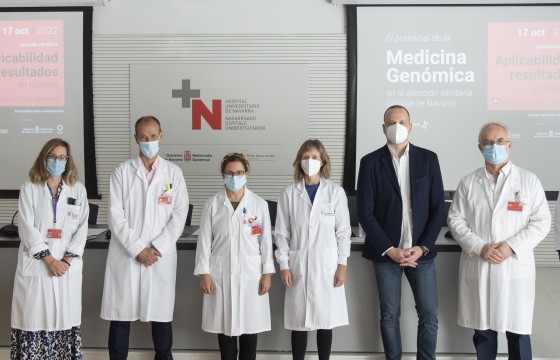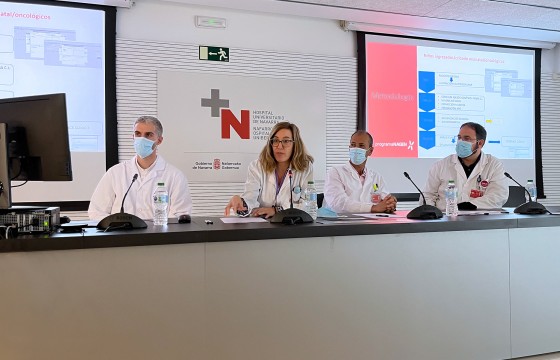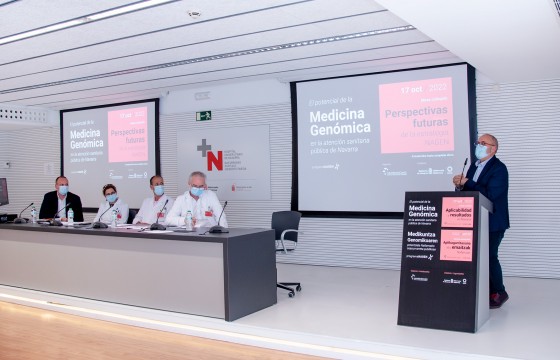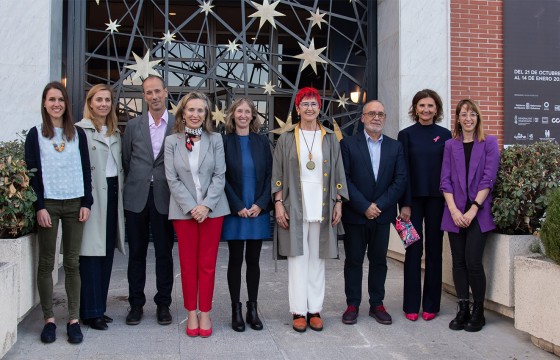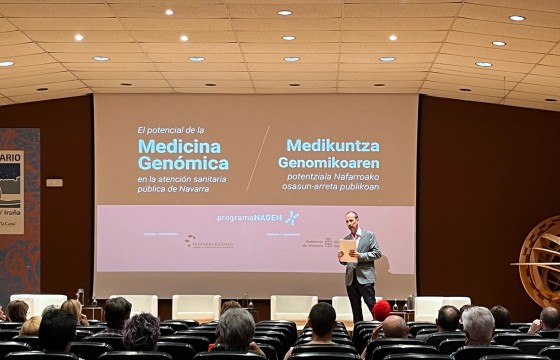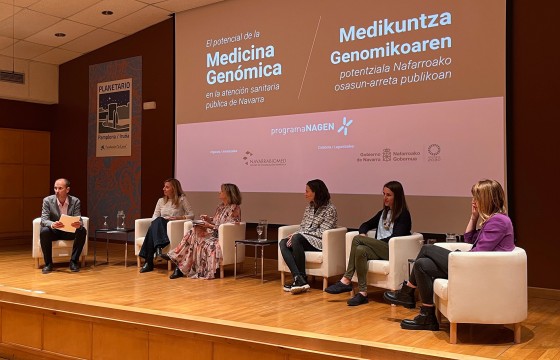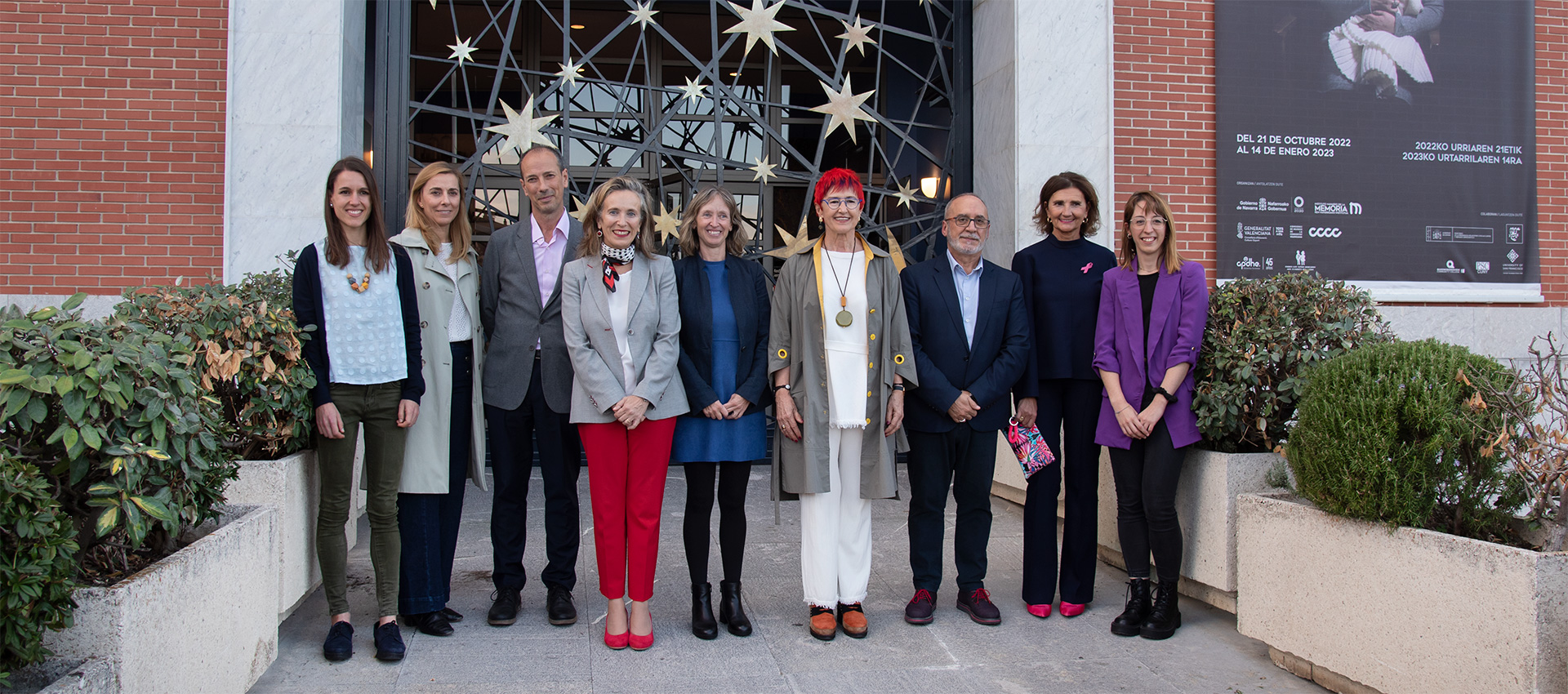
Patients and clinical professionals discuss the potential of genomic medicine in Navarra
Navarrabiomed has organized a talk-colloquium having the participation of Minister Santos Induráin and Minister Juan Cruz Cigudosa.
In order to analyse and disseminate the potential of genomic medicine in public health care in Navarra, Navarrabiomed has gathered patients and clinical and research staff of the NAGEN program at the Pamplona / Iruña Planetarium. Led by the public biomedical research centre together with the University Hospital of Navarra, NAGEN is a strategic program, funded by the Department of Economic and Business Development of the Government of Navarra, to implement genome analysis in the clinical practice of the Navarra Health Service-Osasunbidea (SNS-O).
The medical challenges of the future require the promotion of personalized and precision medicine, and the most disruptive change arises from the knowledge of the genetic profile of each person in order to, depending on their individual characteristics, adjust the most appropriate health care, at the appropriate time, according to their health or illness conditions. This way every the patient is the focus and research and collaboration are key in the health ecosystem.
This has been pointed out by the Minister of Health, Santos Indurain, during the institutional opening. Induráin has highlighted the importance of sharing experiences, achievements and difficulties in the progress towards personalized medicine “to improve the assistance provided to the patient, contribute to a more rational use of health resources and favour the sustainability of the public health system”. In addition, he has stated that “the NAGEN program has positioned Navarra at the forefront of this methodology at the state level, and it can be an important instrument for regional development since it promotes biomedical research and explores a new area of industrial development”.
For her part, the director of Navarrabiomed, Maite Mendioroz, he stressed “the need for research and clinical care to be well interconnected. This bidirectional transfer is necessary to put the patient at the centre of research, and thus ensure that research activity has a direct impact on people's quality of life.”
Mendioroz has also dedicated words of gratitude to patients, patient associations, the centre’s staff, and public health professionals "that enable initiatives like NAGEN to go beyond the laboratory and be applied in patient consultations”.
Experts and patients share their experience
This was followed by a panel discussion moderated by Ángel Alonso, head of the Genomic Medicine Unit of Navarrabiomed, who explained the beginnings of the program that began in 2016 with the NAGEN1000 project, dedicated to the diagnosis of rare diseases: “The success of this first project led us to expand its field of application to other sectors such as pharmacological prescription, familial hypercholesterolemia, rapid diagnosis for the management of children in acute serious clinical situations, or the prevention of breast cancer”. The colloquium focused on these issues, which brought together patients, patients' families and genetic counsellors in the same forum.
During discussion, special emphasis was placed on the usefulness of genome-wide study for an accurate diagnosis in cases of illness in which there is no specific clinical suspicion, the possibility of obtaining secondary findings that allow to establish preventive controls in diseases such as breast cancer, the genetic study in direct relatives or the secondary reuse of genomic data for clinical and research purposes.
Patient Associations in Navarra have also had a prominent role in the conference, represented by María José Oraá, president of Saray. According to Oraá “by empowering the patient, the quality of health care can be significantly improved. In this regard, the study of the genome allows us to know each patient individually, we do not cure the disease, but we understand that specific patient”. The president of Saray referred to knowledge and research as levers for better health, and recalled the role played by patient associations, with a long history behind them in social awareness, dissemination and disease prevention.
Scientific conference for clinical and research staff
The talk-colloquium put an end to the conference organized by Navarrabiomed under the title “The potential of genomic medicine in public health care in Navarra”, which has also included a scientific session this morning at the University Hospital of Navarra, aimed at clinical and research staff. The meeting has analysed the present and future of the NAGEN program, with the participation of Juan Cruz Cigudosa, Minister of University, Innovation and Digital Transformation.
During his intervention at the scientific conference of the NAGEN program, the Minister Cigudosa, has recognized the progress of Personalized Medicine in the Regional Community during the last years with the support of the Government of Navarra.
The development of this medicine, the Minister has pointed out, “is a decisive commitment for this Government because it not only improves patient care, but also promotes scientific and technological research and stimulates economic development, making the Autonomous Community a leading region in this area”. And he has encouraged the clinical staff to become aware of what is coming: “Navarra takes the lead in our country in the field of precision medicine, related concepts and needs. We have to take advantage of this moment and success largely depends on health professionals”.
The NAGEN program consists of 6 projects that will sequence about 3,500 genomes in Navarra in 9 years, and is one of the most ambitious European initiatives in this field. The program has been awarded by the International Consortium of Personalized Medicine ICPerMed, with the award for the Best Practice in Personalized Medicine in 2018 and 2021.
Photo caption. From left to right: Ane Miren Sagardia; Sara Pasalodos; Ángel Alonso; Izakun Goñi; Maite Mendioroz; Santos Induráin; Juan Cruz Cigudosa; Mª José Oraa; and Mónica Arasanz.






